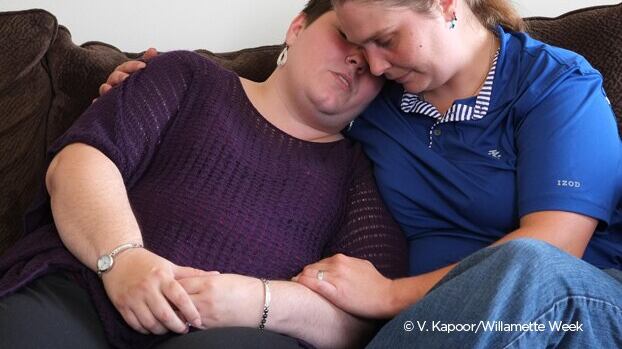The Oregon Court of Appeals today heard oral arguments regarding the 2015 decision to issue a $135,000 state fine to the Gresham cake shop owners who refused to sell a wedding cake to a lesbian couple.
The case is being revisited following the U.S. Supreme Court's 2018 decision to overturn a Colorado court's ruling against a baker who refused to make a cake for a gay couple, known as Masterpiece Cakeshop v. Colorado Civil Rights Commission.
The owners of Sweet Cakes by Melissa, Aaron and Melissa Klein, cited religious liberty in refusing to sell a wedding cake to Rachel and Laurel Bowman-Cryer in 2013. Two years later, the Oregon Bureau of Labor and Industries determined that Sweet Cakes violated anti-discrimination laws and fined the Kleins' business, which is now closed.
Now, the Kleins are arguing that the Oregon Bureau of Labor and Industries did not act with neutrality in deciding their case in 2015. That's an argument that carries new weight after the U.S. Supreme Court set a narrow precedent with its ruling on on the Colorado case: that state regulators disqualified themselves by expressing contempt for Christianity while enforcing the law.
If the Oregon Court of Appeals finds a similar bias here, the Sweet Cakes decision will need to be remanded to a lower court. The judges did not seem sure how such a process would take place, and asked attorneys from both sides for their opinions on how far back and to which court the case would be remanded should the court choose that course of action.
Judges during Thursday's hearing discussed whether hostility toward religion was exhibited when BOLI issued the fine in 2015.
Presiding Judge Erin Lagesen pointed to the fact that the BOLI prosecutor "compared the [Kleins'] religious beliefs to prejudice," which could indicate a bias.
Judge Bronson James questioned the Bureau of Labor and Industries about the fact that the prosecutor in 2015 used the phrase "hate-filled" to describe the Kleins' comments—again indicating a potential lack of neutrality in handling the case. The court debated whether the 2015 prosecutor himself called the comments "hate-filled," or if he was quoting a witness in so doing. The latter could indicate a bias, while the former would not.
Both of these factors strengthen the Kleins' argument, which is that the Bureau of Labor and Industries exhibited hostility toward their religion when ruling on their case.
The Kleins' attorneys, from First Liberty law group, called the $135,000 fine excessive and therefore punitive, especially when compared to other similar cases where such fines hovered in the tens-of-thousands.
The Bureau of Labor and Industries stood by its 2015 decision—and said it was substantially different from the Colorado prosecution of Masterpiece Cakeshop.
"In Masterpiece, the court concluded that the record clearly showed hostility toward religion," Carson Whitehead, an attorney for the Bureau of Labor and Industries (BOLI), said. "This court should re-affirm its previous decision and reject petitioners' claim that BOLI failed to treat their religious objections with neutrality."

The Sweet Cakes case was one of the defining fights of the past decade, drawing national attention to Oregon as the battle lines between the religious right and LGBTQ+ groups were redrawn. On Thursday, the familiar players were on hand—with little change to their views or frustrations.
After the hearing ended Thursday afternoon, Rachel Bowman-Cryer stood next to her wife, Laurel, and addressed reporters.
"That was seven years ago, and here we are with what should be a simple discrimination complaint back again for even more arguments before this court of appeals," Rachel Bowman-Cryer said through tears. "We both grew up in a very conservative religious environment where it wasn't often safe to be gay. We thought we had come to a much safer community in Oregon."
Jeremy Dys, an attorney for the the Kleins, said he is grateful for the opportunity to revisit this case.
"Melissa [Klein] hopes some day to be able to open her shop once again, and maybe that'll come true," Dys said.

